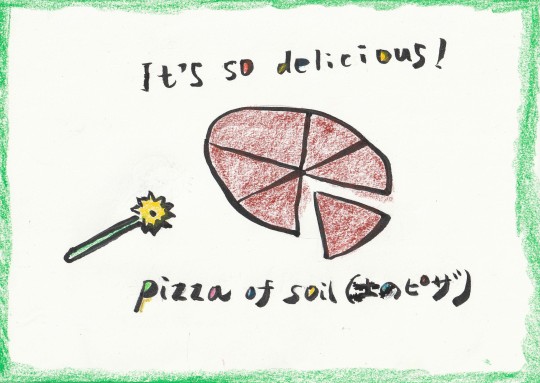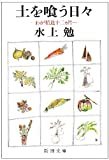#Shurihandoku
Text
Days of eating soil (book review) ... Tsutomu Mizugami's "food" essay

earthen pizza (just kidding)
Mr. Tsutomu Mizugami(勉 水上) (1919-2004) died recently, but he has an excellent book on "food". That is "every day eating soil, my devotion 12 months". (Although it seems to be read as "Minakami Tsutomu", he called it "Mizugami".)
When I used to read the manga "Oishinbo: a eater delicious foods", the main character, Shiro Yamaoka, when he said, "Among the cooking-related books that are full of street now, it's only worth reading ..." I had an intuition, and that's right, Shiro mentioned this book. The only such (= worth reading) book is "days of eating soil". I knew this book about 30 years ago.

Days of eating soil-Twelve months of my devotion (Shincho Bunko)
• Author: Tsutomu Minakami
• Publisher / Manufacturer: Shinchosha
• Release Date: 08/27/1982
• Media: Bunko
However, if I get a little mischievous, "If only" the days of eating soil "are worth reading, then" Oishinbo "will also be" a book not worth reading ", and it will be praised for its worthless book. "Days of eating soil" also invites the paradox that "it is not worth reading". Well, it's the rashness of Tetsu Kariya, the author of "Oishinbo". "Oishinbo" should have been excluded.
Coupled with the appearance of this "Oishinbo" and "children who refuse to eat the food in front of them because they are too annoying with the ingredients", it was a work with greater merit and demerit.
By the way, Tsutomu Mizugami was born in a poor lumberjack's house in the Wakasa region of Fukui prefecture. Was sent to a Zen temple). There he learns the basics of Vegetarian food, but at the end he leaves the temple, experiences various jobs, and is recognized as a writer for his work "Frying Pan Song". Then He had became a Naoki Prize writer.
In this book, if you read it in anticipation of a "cooking recipe", you will be wrong. Well, there is a way to pickle Umeboshi in the upper reaches of the water, but this book is a book that describes the "heart of cooking". Of course, Mr. Mizukami's culinary spirit shines when he encounters various ingredients.
At the time of writing this book, Mr. Mizugamiami lived in Karuizawa Town, Nagano Prefecture. Therefore, he develops the topic of vegetables and fruits that he can make, receive, and buy by himself. One of them, the part where Dogen Zenzi's(道元禅師) words were chewed upstream of the water:
@@@@@@@@@@@@@@@@@@@@@@
When cooking and preparing all items, do not look at them with the eyes of ordinary people. Don't think in the mind of a mediocre person. You have to pick up a piece of grass and build a big temple and go into something like a fine dust to do the Buddhist sermon. Even when making poor vegetable cuisine, you shouldn't be disgusted or poor. Even if you're making a good meal with milk, don't be overjoyed. You should hold back your bouncing heart. You must not be obsessed with anything. Why is there a way to dislike poor things? Why don't we try to be good without being lazy even if it is poor? Never let your heart move by being caught up in the goodness of goods. Changing the mind with things and changing the language with people is not something that is bodhicitta.
@@@@@@@@@@@@@@@@@@@@@@@@
33P-34P
This word is the fundamental thesis of "every day eating soil". For example, with regard to radish, while despising an actor who cannot sell as a "radish actor", he says, "There are no ingredients that are as grateful as radish that can be obtained anytime, anywhere." , I think that it is a good radish with enough "spiciness".
@@@@@@@@@@@@@@@@@@@@@@@
Also, from the description in the chapter in July, myoga (Japanese ginger) is called "stupid" by the greengrocers. Shurihandoku(One of disciples of Buddha )has a weak memory by nature, often forgets his name, walks with his name tag down, and myoga grows from his dead grave. I followed him around. Here is a word from Mr. Mizugami: "For me, myoga is like a summer vegetable that I want to do a medal, but what do readers think? I don't know the vegetables that have the amazing flavor). "
@@@@@@@@@@@@@@@@@@@@@
122P-126P
A word of the day: Winter, when you eat only dry foods without blue vegetables, spring April and edible wild plants, bamboo shoots in May, plum making in June, Japanese ginger in July, and so on. Seasonal ingredients will appear naturally, and you will be able to see each ingredient and the dishes made with it. Please take a look at this work, which is like a gem that treats those ingredients without distinction.
#Tsutomu Mizugami#水上勉#Days of eating soil#food essay#devotion#Oishinbo#Dogen Zenzi#zen#myoga (Japanese ginger)#Shurihandoku#gem#Rei Morishita
8 notes
·
View notes